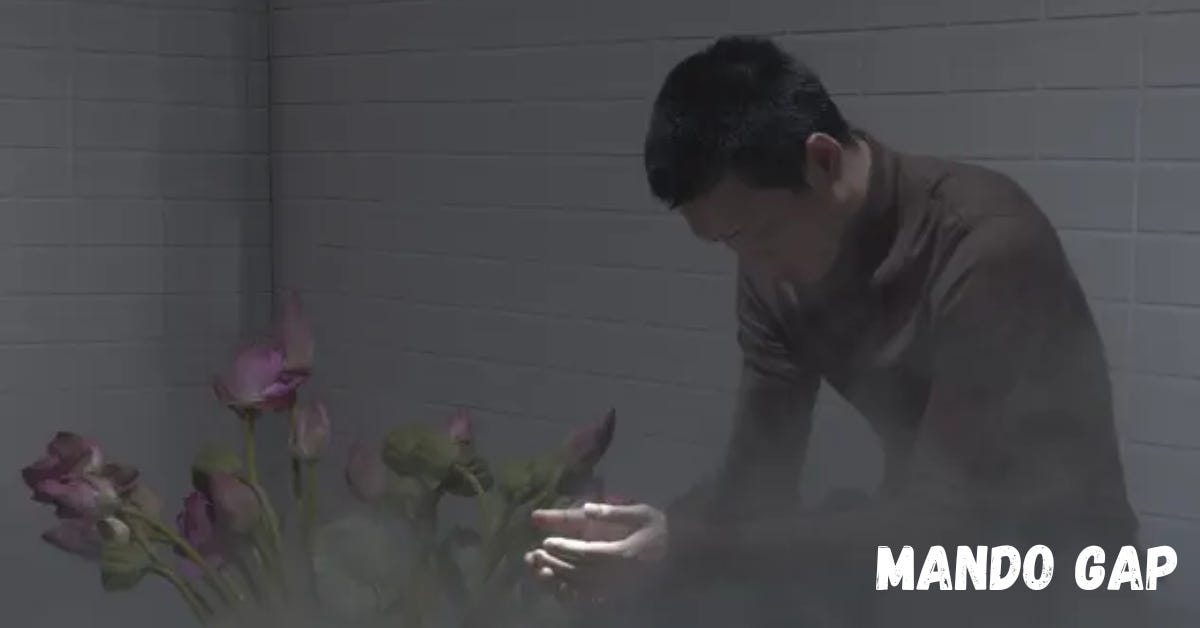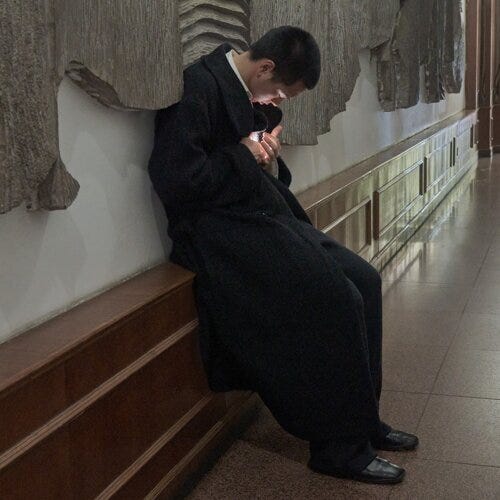#45: My Sunny Heart
on the traditionalism and hypnagogic longing of Wen Zhaojie's new album, 'My Sunny Heart'
Can you believe it’s November already? Some more small talk: can you believe people are publishing lists so soon? Isn’t is strange how early it gets dark? Didn’t you feel like it used to get colder around this time of year? What’s your favourite album from this year? Are you in love?
I don’t really have much anymore. It’s been an exhausting month, but I made it through, you made it through and we’re here now and I wrote about Wen Zhaojie’s new album and some singles from Eric Chou, JUD, Accusefive—three of the biggest artists right now in the sense that they’re everywhere rather than that everyone’s obsessed with them—and Shen An. It’s time to write lists. Does anyone want a mid-decade list from me? I’ll probably have one in January—we’ll see where our heads are at then. Here’s one from UPEE review that’s interesting—mainly for those who are more interested in a rock- and mainland-oriented perspective. You may need to do a bit of translation (but probably just copy and paste the titles into Spotify or something). Would be really interesting if there were more perspectives to piece together a really nice view of whatever “Chinese” music is in 2020s. Anyway, that’s it from me! Take care.
Wen Zhaojie - My Sunny Heart
Cindy Lee, Jessica Pratt, and now, Wen Zhaojie. Traditionalism is at the core of each performer’s latest record; there’s a fuzzy timeless feel that makes each sound like an already minted classic. That word, traditionalism, tends to mean something different in the context of being Chinese: you might imagine some element of fantasy, with instruments like the guzheng or the dizi set to appear alongside imagery that calls to mind the folklore and ceremony of wuxia. But Wen’s oeuvre skews closer to the ‘60s western influences that define Lee and Pratt’s works, embracing sunshine pop, with hints of psychedelia that give it a wondrously hypnotic quality.
This feature is really nothing new for Wen. His debut album, 爱神 (God of Love), sounded like it was transmitted through vintage radio, the warm scuzzy production coiling around the singer’s breathy falsetto. Here, he sang of love in its most tender form, an innocence to the slow dance of the title track as he imagines a love so enduring it becomes buried with him in the grave. These characteristics of traditionalism and hypnagogic longing continue to define Wen’s second album, My Sunny Heart, but its surface feels more defined. “Take Things as They Are,” the album’s easygoing opener, arrives with shimmering arpeggios floating through the mist, but the song solidifies as the clatter of percussion materializes within the mix. No longer do thte songs feel like dusty time capsules, but performances broadcast directly to you.
The power of My Sunny Heart largely lives in its staging: a spare room with nothing but the band and a fog that drifts to its walls. It gives Wen’s songs the feeling that they’re intimate promises. When he sings, “this feeling belongs to you / always belongs to you / but I always unintentionally / hurt you,” the statement, wrapped in a poor excuse of an apology, might approach a platitude, but it’s delivered with the sincerity of a wedding oath. Elsewhere, on “Things I Buried Inside,” he gives off the impression that he’s letting you in, despite his lyrics revealing nothing. These worries are described as “indescribable” and “impossible to grasp.” But hold on, why so guarded? Will these become a problem later down the road? My Sunny Heart asks you let go of this apprehension—“just let it flow,” Wen murmurs. It’s a tough request, but the music is a soothing sedative.
You hear these songs and they feel so intimately private. The closeness is best exemplified by the title track, where Wen’s airy falsetto suddenly sinks to a belted chorus. Before the singer’s rockstar moment can make it feel any less personal, the studio chatter arrives, a reminder that this isn’t some stadium tour, but an exclusive, bedroom show. It’s not just the intimacy that makes the music feel so personal. Though Wen’s influences can mostly be traced to western origins, there are tracks that do feel distinctly Chinese. The glassy arpeggios of “Take Things as They Are” move in pentatonic pattern, “Happy Body” adds celebratory Chinese percussion, and “When I Was Missing” doesn’t sound far off from a Teresa Teng ballad. This fusion isn’t gimmicky or in reverence of the past—it feels like an imagined space built around the concept of China having adopted sunshine pop and psychedelia back in the ‘60s, a glimpse of shown only to you.
Occasionally, Wen pulls out a weird though: “I want to ask you whether you can smell the passing rain,” he hums on “When I Was Missing You.” But more often his lyrics are crafted for universal relatability. He alludes to the feeling of love so often that it’s surprising he doesn’t actually use it until the penultimate track. “Love and hate are entangled to destruction / we will be together until death / just like this, happy until death,” he sings in that characteristic detached falsetto over a familiar waltz rhythm. Is that a good thing? The juxtaposition of words like love and hate and happy and death beside one another could leave you feeling apprehensive. Wen Zhaojie is a prophet, and like any prophet, his words remain ambiguous. You’ve interpreted My Sunny Heart as being about love, because that’s the feeling you think would be playing out of an old radio or some staple back in this dreamed-up era. In its closer he leaves you with one more riddle:“fate is…,” he sings, though it’s hard to decide whether that final word he chooses refers to cruel or cool. Let’s choose the latter, ignore the mist, and be happy until death.
Listen here: Apple Music // Spotify
Eric Chou - “That Night in Paris”
Nice to hear the balladeer do something upbeat—really informative of today’s climate that the song starts with a UK garage beat, then stumbles into Jersey club territory. Eric Chou is far too sleepy-voiced to make this a real dance banger and the song flits across quietly. This is the soundtrack to opposite worlds meeting, a clubgoer attempting to meet a jazz club frequent for a slice of midnight romance. “Forgive me for being such an old soul,” Chou sings, tipsy off one too many gin and tonics, like their tryst could be counted as illicit. Perhaps the nicest touch is the clumsy attempt to make sense of the artist’s palette for sophistication, a blundering, sped-up saxophone solo wafting through the air.
Accusefive - “Speak It Out”
I’ve seen a lot of blowback for Accusefive in the last few years for how trite their sound has become—for what it’s worth, I think their second album is still good, that it’s their third album that’s not so much. Largely, I think everyone wants them to go back to something like “Somewhere in Time,” to that sound that’s anxious and propulsive, while still being magnanimously in love, but the band have long recognized that love in is in the small actions. “Speak It Out” doesn’t move back to that territory, the same usual tricks in a piano, a guitar, a male-female harmony, and one long crescendo. Hell, even the lyric isn’t much new: “just say what you wanna say! just love what you wanna love!” Yet there’s something more interesting in the tremors behind the first chorus, how they simply dissolve as if a little honesty could lighten how heavy your heart feels. The indulgence of the band sells their idea. That twinkle of an ‘80s tribute at the start of the slow build makes the idea of doing whatever you wanna do seem admirable.
JUD - “L!KE”
JUD’s discography thus far has mainly consisted of drama tie-in ballads, but “L!KE” explores Billie Eilish-indebted alt-pop. Despite its minimalism, the song grows from glitchy synthpop textures to brooding, mechanical whir on the final chorus. That beat may initially only sound four, not so much on-the-floor, but it’ll have you bouncing by the end. Her voice is laced with menace and intrigue as she whispers, “I like it like that,” knowing exactly which pockets of space to fill on the grind of chorus.
Shen An - “1+1=”
One plus one is… two. Unless I’ve got my math wrong, or unless you’re sitting in a room, wondering why it feels so empty despite the second body. On “1+1=,” Shen An tries to solve one of math’s trickiest proofs, coming to the conclusion that “neither of these ones came from you.” He’s given it all and you’ve given nothing. Over the dissonant strings, his voice quivers. He’s a ghost, haunting the house you both once called home, wondering whether there’s anything left after all the numbers have been summed up.
Extra Listening
Penny Tai has a new album out today, TWIN FLAME, a collection of covers of songs she’d previously written for others plus one.
babyMINT have a new song, “BB Gals of the Galaxy,” coming tomorrow. Are they baiting me with a “Sticker” flute? If you haven’t yet, read this cool interview with the group in NME. Like woah, I bet whoever interviewed them really knows what they’re doing.
Do you guys know Devin Halbal? She’s on TikTok. She posted this one video of her in Taiwan doing whatever you would call her schtick but like, in Taiwan, and SOWUT turned it into a song—by the way, I don’t know half the words I just used in this paragraph. I don’t know, I don’t really have anything for this section. See you next month, tell me your favourite Chinese albums from the past five years. Here’s a SOWUT song off his album from last December:
Find the latest Canto Wrap and Mando Gap playlists on Spotify and me on Twitter here.





